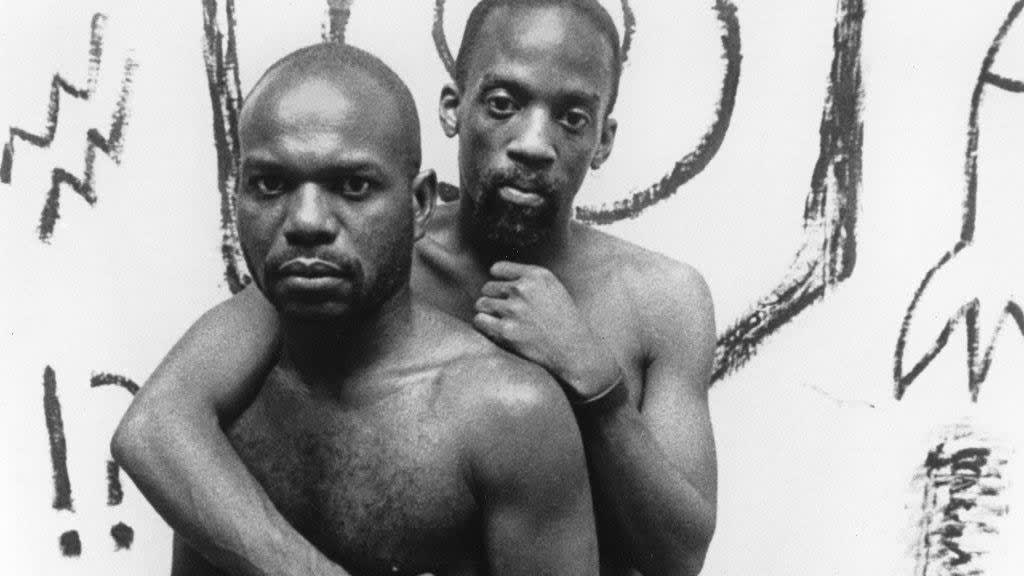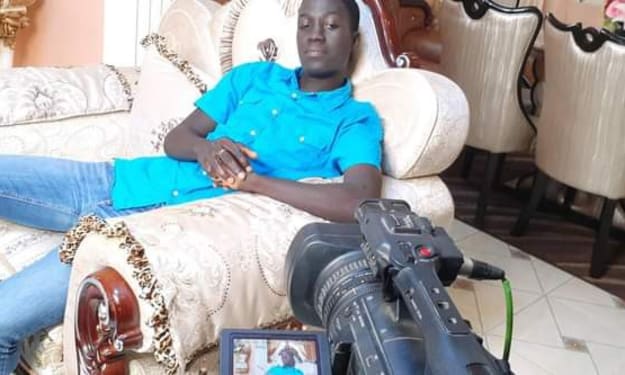OVID to Release Films With Diverse Content
Diversity of Content Including Seven Films by Iconic Black, Gay Filmmaker Marlon Riggs

OVID to release 33 films in September, its most ever in a single month, with a diversity of content including seven films by iconic Black, Gay Filmmaker Marlon Riggs.
Other highlights include the newly restored and first time available on any platform version of Chantal Akerman’s From the East, acclaimed German cinematic essay Heimat Is A Space In Time, Let the Fire Burn, which echoes clashes between citizens and the police today, and more.
Jonathan Miller, director of OVID.tv, the curated streaming destination for documentaries and art-house films, announced today that OVID will be adding 33 films, its most ever in a single month, to its September streaming lineup—a roster of films with a diversity of approach, form and content unlike that on any other platform. He pointed out the selections of contemporary global cinema, personal essay films, meticulous archival films, oddities and classics from film history (and about film history), and the first release on any platform of the restored version of Chantal Akerman’s From The East on Sept. 24. And as part of its growing library of Black Lives Matter films, OVID is proud to add a collection of seven films from iconic Black, gay filmmaker Marlon Riggs (1957-1994), which began September 10th.
“If you’ve never heard of Marlon Riggs, you’ll wonder why the hell not. How could an artist this smart, this prescient, this frank, transparent, curious, ruminative and courageous — this funny — escape your notice? Why haven’t these trenchant, masterful video essays, with insinuatingly tangy names like ‘Color Adjustment,’ ‘Ethnic Notions’ and ‘Black Is… Black Ain’t,’ been a part of not just your movie diet but also your sense of self-understanding? How come nobody told me?!” - Wesley Morris, The New York Times.
Riggs was an American filmmaker, educator, poet and gay rights activist. Riggs created aesthetically innovative and socially provocative films that examine past and present representations of race and sexuality in America. The seven documentaries he produced, wrote and directed, which will stream on OVID, include, the Emmy winning Ethnic Notions (1987), the Teddy winning Tongues Untied (1989), Affirmations (1990), Anthem (1991), the Peabody winning Color Adjustment (1991), Non, Je Ne Regrette Rien (No Regret) (1992) and the the IDA and Sundance award-winning Black Is…Black Ain’t (1995). When Tongues Untied aired on the PBS series POV in 1991, it brought about controversy as some public TV stations refused to air it, and it also riled some groups in the religious right. In 1988, Riggs was diagnosed with HIV. He continued to teach and work on his films, even as his health deteriorated. He passed away on April 5, 1994. The Marlon Riggs Collection is now housed at Stanford University Libraries.
Women directors in the spotlight in September include Vivian Qu’s narrative feature Angels Wear White (Sept. 4), about the assault of two teenage girls in China, for which Indiewire called “the perfect film for the #MeToo movement.” There is also Julie Bertuccelli’s The Tree (Sept. 11) starring Charlotte Gainsbourg, Nancy Cooperstein Charney’s Who’s Next? (Sept. 23), which examines how the lives of Muslim-Americans have been affected in the aftermath 9/11, Anna Moot-Levin & Laura Green’s The Providers (Sept. 23), Nancy Buirski’s Afternoon of a Faun (Sept. 29) and Jo Ann Kaplan’s Invocation - Maya Deren (Sept. 29) about the legend of avant-garde cinema.
September also brings Thomas Heise’s cinematic essay through 20th-century Germany history Heimat Is A Space In Time (Sept. 8), the four-part docuseries The Hitler Chronicles (Sept. 8), the epic drama Lumumba (Sept. 11) directed by Raoul Peck (I Am Not Your Negro), Andrei Ujica’s documentary The Autobiography of Nicolae Ceausescu (Sept. 18), which tracks the rise and fall of the infamous Romanian dictator through his own propaganda footage, and the gripping found-footage documentary Let the Fire Burn (Sept. 17), which chronicles a longtime feud between the city of Philadelphia and a controversial radical urban group, which came to a deadly climax in 1985. First-time filmmaker Jason Osder has brought to life one of the most tumultuous and largely forgotten clashes between government and citizens in modern American history.
Other highlights include Tony Manero (Sept. 15) from director Pablo Larraín (Ema, Jackie), a duo of docs that take to the waters include 90 Degrees South (Sept. 22), Herbert G. Ponting's spellbinding chronicle of Captain Robert Scott's heroic and ultimately tragic race for the South Pole, and Drifters (Sept. 22) by early silent filmmaker John Grierson, who creates a ‘city symphony’ out of the North Sea herring fisheries, and a contemporary classic, Camille Claudel (Sept. 24) starring Isabelle Adjani and Gérard Depardieu.
Details on all the films coming to OVID in September are below. Stay tuned for even more releases coming soon!
Friday, September 11th
Diplomacy
Directed by Volker Schlöndorff; Zeitgeist Films, Narrative
France, Germany
In 1944, Raoul Nordling, the Swedish consul-general in Paris, meets with Dietrich von Cholitz, the German military governor of occupied Paris, to convince him not to destroy historical landmarks across the city.
“PASSIONATE, ENGAGING AND EMOTIONAL... A fine return to form for the veteran German helmer... An elegant orchestrated pas de deux between formidable opponents.” —Variety
Lumumba
Directed by Raoul Peck; Zeitgeist Films, Narrative
Zimbabwe, Mozambique and Belgium
From the director of I AM NOT YOUR NEGRO.
Made in the tradition of such true-life political thrillers as Malcolm X and JFK, Raoul Peck’s award-winning Lumumba is a gripping epic that dramatizes for the first time the rise and fall of legendary African leader Patrice Lumumba.
The Tree
Directed by Julie Bertuccelli; Zeitgeist Films, Narrative
The exquisite Charlotte Gainsbourg (Antichrist, Melancholia,I’m Not There) stars in French filmmaker Julie Bertuccelli’s achingly beautiful follow-up to her sleeper hit Since Otar Left. The Closing Night Film at Cannes in 2010, THE TREE is a mystical drama of loss and rebirth in the Australian countryside. Not since classic 1970s works Picnic at Hanging Rock and Walkabout has the harshly gorgeous outback landscape been such a lyrical yet foreboding metaphor for grief and coming of age.
Monday, September 14th
Directed by Marlon Riggs; Signifyin’ Works, Documentary
U.S.
Black Is…Black Ain’t (86 minutes, 1995)
Marlon Riggs' final film debates Black identity, white critiques, sexism, patriarchy, homophobia, colorism and cultural nationalism. "Riggs' eye turns pain into poetry, ordinary people into prophets. To put it simply: 'Black Is...Black Ain't' is moving and brilliant." - Gloria Naylor
Tuesday, September 15th
Cinema of Tears: A Century of Latin American Cinema (1995)
Directed by Nelson Pereira Dos Santos; BFI, Documentary
U.K.
Personal view of the Latin American cinema by Brazilian director Nelson Pereira dos Santos, based on an adaptation of a novel by Silvia Oroz. In this way, using two protagonists, a 65-year-old and a 25-year-old, a wide cross-section of Latin American cinema is shown, especially those turning on the subject of different stories of love and melodrama.
Tony Manero
Directed by Pablo Larraín; Kino Lorber, Feature
Chile
On weekends, 50-something Raul Peralta (Alfredo Castro) goes to the same bar outside his native Santiago, Chile, and, with friends, dances to the hits from his favorite film, "Saturday Night Fever." When he gets wind of a TV contest seeking the best imitation of Tony Manero, the main character from the film, he becomes fixated on winning. But as Raul becomes involved in nefarious activities—including murder—to complete his Tony Manero transition, he puts his friends and himself at risk.
OFFICIAL SELECTION CANNES / NEW YORK / TORONTO
"An indelible portrait of a sociopath with the soul of a zombie." —The New York Times
"Marvelously unhinged study of pop culture obsession." —The Village Voice
The City of the Future
Directed by Maríllia Hughes and Cláudio Marques; PRAGDA, Narrative
Brazil
In Serra do Ramalho, Brazil, young teacher Milla finds herself pregnant by her colleague Gilmar. Gilmar is in a relationship with Igor, but Milla asserts that the baby will belong to all three of them. Despite some initial conflict between the three, and in defiance to their community’s reaction, they form an unconventional but remarkably uncomplicated family. Billed as the ‘city of the future’, Serra do Ramalho was constructed in the 1970s in order to rehouse thousands of citizens that had been forcefully relocated. The location forms an important backdrop for this elegant, gentle film which is full of hope for a new generation building their own family of the future.
“An elegant, kind film, full of hope for a new generation that is making their own family of the future.” – MELBOURNE FILM FESTIVAL
BEST LATIN AMERICAN FILM, BUENOS AIRES INDEPENDENT FILM FESTIVAL
Wednesday, September 16th
Directed by Marlon Riggs; Signifyin’ Works, Documentary
U.S.
Tongues Untied (55 minutes, 1989)
A landmark and controversial personal documentary essay on experiences of black gay men and the search for identity. It has been critically acclaimed as one of the most important documentaries of the 20th century. "A black male warrior fighting for the right to love other black men, Marlon Riggs affirms what was nearly lost, newly found; the certainty that black male lives are utterly precious." -- Alice Walker
Affirmations (10 minutes, 1990)
Explores black male dreams and desires and is framed by the poetry of Essex Hemphill.
Anthem (8 minutes, 1991)
An experimental music video asserting a defiant homoeroticism of African American male sexuality.
Non, Je Ne Regrette Rien (No Regret) (38 minutes, 1992)
A poetic and intimate film presenting moving testimonials and portraits of five black gay men. They each disclose their HIV+ status and how they fiercely combat the stigma around the disease.
Thursday, September 17th
Hissein Habre, A Chadian Tragedy
Directed by Mahamat-Saleh Haroun; Icarus Films, Documentary
France
In 2013, former Chadian dictator Hissein Habre's arrest in Senegal marked the end of a long combat for the survivors of his regime. Accompanied by the Chairman of the Association of the Victims of the Hissein Habre Regime, Mahamat Saleh Haroun goes to meet those who survived this tragedy and who still bear the scars of the horror in their flesh and in their souls. Through their courage and determination, the victims accomplish an unprecedented feat in the history of Africa: that of bringing a Head of State to trial.
"Heart-stopping... Unflinching." —The Guardian
2016 Cannes Film Festival
William and the Windmill
Directed by Ben Nabors; Passion River, Documentary
U.S.
With only a library book as his guide, 14-year-old William Kamkwamba builds a windmill in his Malawian village that changes his life forever. Using junk parts and an inexhaustible imagination, he harnesses enough energy to power a generator that saves his family from famine and resuscitates his dying farming community.
An instant media sensation, the teen soon has the ability to chart a previously unimaginable future of Ivy League schools and speaking tours. But despite the support of an American entrepreneur who helps him navigate his success, some changes threaten to capsize him. He was once just a kid back home, but suddenly he's a village leader. Away at school, the famous boy inventor struggles on a steep learning curve.
Winner of the SXSW Grand Jury Prize for Best Documentary, Indiewire.com describes it as a "fascinating look at the tricky balancing act of third world activism."
Friday, September 18th
The Autobiography of Nicolae Ceausescu
Directed by Andrei Ujica; Kino Lorber, Documentary
Romania
A monumental achievement, THE AUTOBIOGRAPHY OF NICOLAE CEAUSESCU tracks the rise and fall of the infamous Romanian dictator through his own propaganda footage. Writer and director Andrei Ujica, along with editor Dana Bunescu, crafted over 1,000 hours of official state broadcasts and intimate home movies into a three-hour tour-de-force that depicts how Ceausescu created the country in his own image, regardless of the cost to its citizens. His rapid ascent to power is aided by rubber stamp parliamentary meetings and celebrated in garish visits to Communist allies including North Korea. A hero in his mind, Ceausescu is combative, vain, and unquestioningly in control.
“Brilliant!” —The New York Times
Let the Fire Burn
Directed by Jason Osder; Kino Lorber, Documentary
U.S.A.
In the astonishingly gripping Let the Fire Burn, director Jason Osder has crafted that rarest of cinematic objects: a found-footage film that unfurls with the tension of a great thriller. On May 13, 1985, a longtime feud between the city of Philadelphia and controversial radical urban group MOVE came to a deadly climax. By order of local authorities, police dropped military-grade explosives onto a MOVE-occupied rowhouse. TV cameras captured the conflagration that quickly escalated—and resulted in the tragic deaths of eleven people (including five children) and the destruction of 61 homes. It was only later discovered that authorities decided to “...let the fire burn.” Using only archival news coverage and interviews, first-time filmmaker Osder has brought to life one of the most tumultuous and largely forgotten clashes between government and citizens in modern American history.
Winner - Best Editing in a Documentary Feature - Tribeca Film Festival
Special Jury Mention - Best New Documentary Director - Tribeca Film Festival
“Electrifying!” —New York Magazine
The Animals Film (1982)
Directed by Victor Schonfeld & Myriam Alaux ; BFI, Documentary
U.K.
Controversial, confrontational and riveting, this unique work received worldwide critical acclaim for its filmic power, questioning how and why modern societies exploit animals for food, fur, sport, entertainment and science. Features interview with Peter Singer.
Tuesday, September 22nd
90 Degrees South (1933)
Directed by Herbert G. Ponting; BFI, Documentary
Herbert G. Ponting's spellbinding chronicle of Captain Robert Scott's heroic and ultimately tragic race for the South Pole (not only did Amundsen reach the goal first but Scott and his entire team died on the return trip) was originally released in 1913. Ponting, who had been a renowned still photographer, dedicated his life to Scott's memory. Twenty years after his friend's death, he produced and narrated 90 Degrees South, the 1933 sound re-release of his original footage.
Drifters (1929)
Directed by John Grierson; BFI, Documentary
Early silent filmmaker John Grierson creates a ‘city symphony’ out of the North Sea herring fisheries, filmed at Lerwick, in the Shetlands, Lowestoft and Yarmouth and in the North Sea. Both a celebration of modern industry and a meditation on natural elements (sea, birds, fish), Grierson creates a strikingly balanced reflection on the process of historical change and modernisation.
Silent Shakespeare
Various Directors; BFI; Narrative
The seven short films in this unique collection – from Britain, Italy and the USA – are created from the only known surviving materials, nitrate prints preserved by the BFI’s National Archive. They include beautiful examples of hand stencilling and tinted prints. There is a magical version of A Midsummer Night’s Dream containing some remarkable special effects, a charming five-minute film of The Tempest, and the very first Shakespeare film ever made, King John, in 1899. This unique and fascinating record shows us the exuberance, invention and conviction of these early filmmakers and demonstrates the possibility of the Shakespearean text.
The complete collection, accompanied by a specially commissioned score by award-winning young composer Laura Rossi, contains:
King John (UK, 1899)
The Tempest (UK, 1908)
A Midsummer Night’s Dream (USA, 1909)
King Lear (Italy, 1910)
Twelfth Night (USA, 1910)
The Merchant of Venice (Italy, 1910)
Richard III (UK, 1911)
Wednesday, September 23rd
Who’s Next?
Directed by Nancy Cooperstein Charney; Bullfrog Films, Documentary
U.S.
WHO'S NEXT? examines how the lives of Muslim-Americans have been affected in the aftermath of the September 11th terrorist attacks. It focuses on six Muslim families—citizens and long-time legal residents—from diverse countries and widely different circumstances. In one way or another all of them have been targeted by federal agencies, hate groups, and even former friends solely on the basis of their religious beliefs.
"The best and most profound movie I've seen recently...As unsettling as it is important. It is an extremely well-made documentary, uncluttered, never resorting to inflated dramatics. The drama is in the stories of the families. Who's Next? is the type of artistic expression essential to those who cherish the concept of democracy." —David Rothenberg, host, Any Saturday, WBAI
The Providers
Directed by Anna Moot-Levin & Laura Green; Bullfrog Films, Documentary
U.S.
THE PROVIDERS follows three healthcare providers in northern New Mexico. They work at El Centro, a group of safety-net clinics that offer care to all who walk through the doors, regardless of ability to pay. Amidst personal struggles that reflect those of their patients, the journeys of the providers unfold as they work to reach rural Americans who would otherwise be left out of the healthcare system. With intimate access, the documentary shows the transformative power of providers' relationships with marginalized patients.
For more information on upcoming films that will be streamed visit www.ovid.tv
About the Creator
Tammy Reese
Tammy is best known for her legendary interviews with Sharon Stone, Angela Bassett, Sigourney Weaver, Geena Davis, Morris Chestnut, Jeffrey Dean Morgan, Sheryl Lee Ralph, Laurence Fishburne, Omar Epps, Joseph Sikora, and more.






Comments
There are no comments for this story
Be the first to respond and start the conversation.